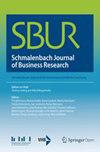Digital Maturity of Forecasting and its Impact in Times of Crisis
Q3 Economics, Econometrics and Finance
Schmalenbachs Zeitschrift fur Betriebswirtschaftliche Forschung
Pub Date : 2023-10-13
DOI:10.1007/s41471-023-00171-1
引用次数: 0
Abstract
Abstract Especially in times of crisis, reliable predictions about probable future developments are difficult, but critical for successfully managing business operations. At the same time, it remains unclear what constitutes a good forecasting process during crises. The aim of this study is to analyze whether and how digital transformation can enhance forecasting processes and enable firms to better deal with crises. To do so, we refer to the concept of digital maturity, i.e., the extent to which digital transformation is adopted in internal processes, studied at the practice of forecasting. Specifically, we analyze whether digitally more mature forecasting processes positively influence (1) satisfaction with forecasting during crises, (2) the effectiveness of countermeasures, and (3) the economic situation during crises. We conduct a cross-sectional survey among 195 medium-sized and large companies in Germany to shed light on the forecasting process and its digital maturity as well as on the impact of the COVID-19 economic crisis on companies. Based on ordinary least squares (OLS) regression, we find that digitally more mature forecasts increase satisfaction with forecasting and the effectiveness of countermeasures. Overall, this study provides new insights into relevant aspects of forecasting to support successful crisis management, and it highlights the importance of advancing digital transformation in forecasting, especially to successfully deal with crises.预测的数字化成熟度及其在危机时期的影响
特别是在危机时期,对未来可能发展的可靠预测是困难的,但这对成功管理业务运营至关重要。与此同时,目前尚不清楚在危机期间,什么是一个好的预测过程。本研究的目的是分析数字化转型是否以及如何增强预测流程,使企业能够更好地应对危机。为此,我们参考了数字化成熟度的概念,即在预测实践中研究的内部流程中采用数字化转型的程度。具体来说,我们分析了数字上更成熟的预测过程是否会对(1)危机期间的预测满意度、(2)对策的有效性以及(3)危机期间的经济形势产生积极影响。我们对德国195家大中型企业进行了横断面调查,以了解预测过程及其数字化成熟度,以及新冠肺炎经济危机对企业的影响。基于普通最小二乘(OLS)回归,我们发现数字预测越成熟,预测满意度和对策有效性就越高。总体而言,本研究为预测的相关方面提供了新的见解,以支持成功的危机管理,并强调了推进数字化转型在预测中的重要性,特别是对成功应对危机的重要性。
本文章由计算机程序翻译,如有差异,请以英文原文为准。
求助全文
约1分钟内获得全文
求助全文
来源期刊

Schmalenbachs Zeitschrift fur Betriebswirtschaftliche Forschung
Economics, Econometrics and Finance-Economics, Econometrics and Finance (all)
CiteScore
2.10
自引率
0.00%
发文量
15
期刊介绍:
Schmalenbach Journal of Business Research (SBUR) is the joint official journal of Schmalenbach-Gesellschaft für Betriebswirtschaft e.V. and Verband der Hochschullehrer für Betriebswirtschaft e.V. (VHB), replacing the associations‘ former official journals Business Research (BuR), Schmalenbach Business Review (SBR), and building on Schmalenbachs Zeitschrift für betriebswirtschaftliche Forschung (ZfbF). The three journals were merged to form SBUR and ceased to publish under their previous names. SBUR publishes in the English language only.
SBUR is a fully Open Access journal. For information on the publication fees, please go to the Journal Updates section below and read the Note on the Publication Fee.
More information on SBUR and its predecessor journals, including links to their previously published content, can be found in the Journal Updates section as well.
About SBUR
Schmalenbach Journal of Business Research (SBUR) is an international English-language journal that publishes original high-quality research that is of wide interest to business research and practice. Its scope includes traditional and emerging business administration areas, including among others accounting, finance, marketing, strategic management, organization, human resource management, production and logistics management, taxation, digital business, and entrepreneurship. SBUR is open for cross-disciplinary and multi-disciplinary research. State-of-the-art review articles and thought pieces are welcome as well.
Articles apply rigorous research methodologies that fit the research questions to establish their scientific findings, such as analytical modeling, archival empirical and experimental, field and case research. To ensure high-quality scientific standards, articles submitted to SBUR are subject to a rigorous double-blind peer review, that is, reviewers are anonymous to the authors and do not see the names or affiliations of the authors.
SBUR endorses the Open Science philosophy and operates under Gold Open Access, so all published articles are freely and permanently available and accessible through this website.
 求助内容:
求助内容: 应助结果提醒方式:
应助结果提醒方式:


